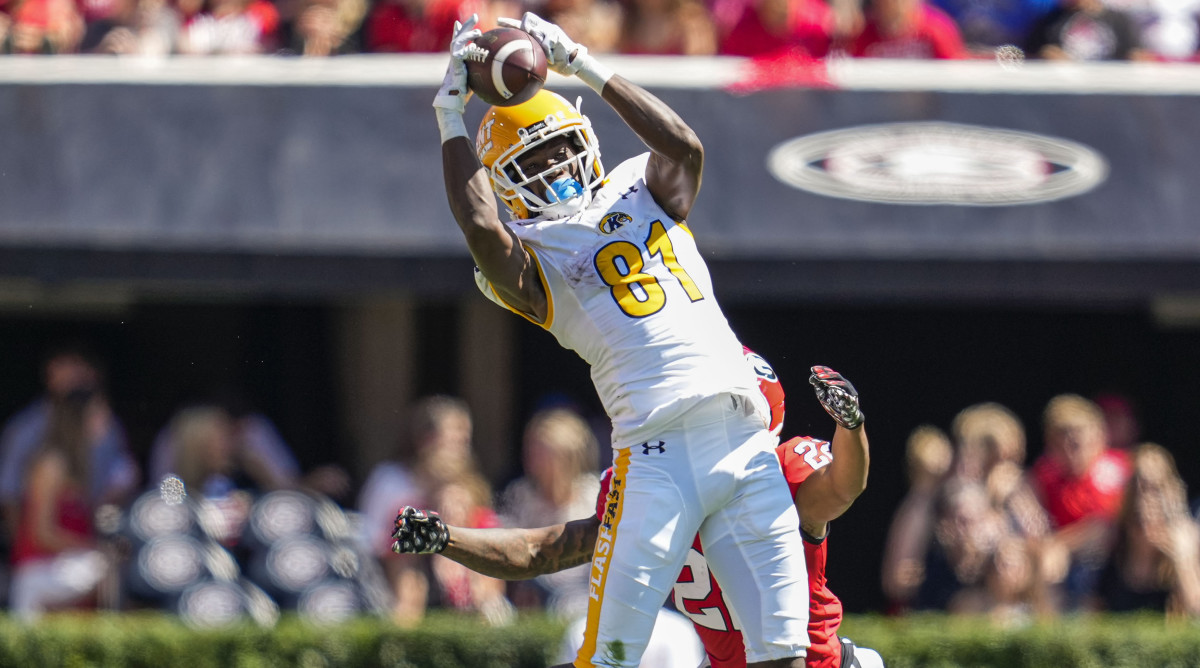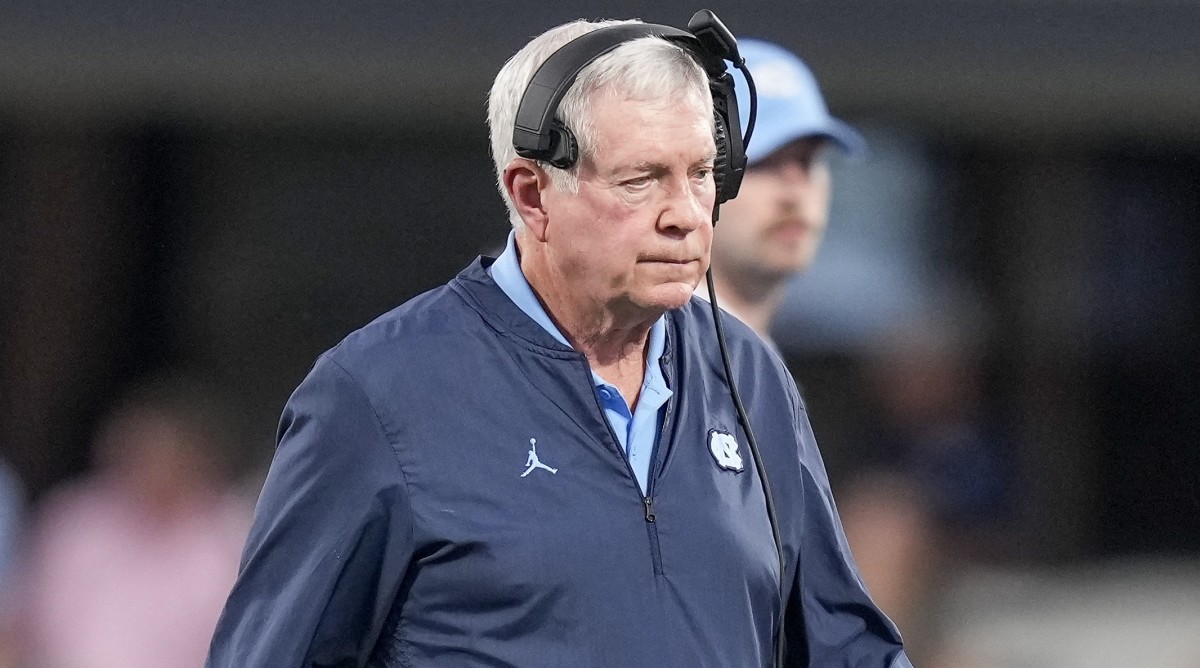Mack Brown’s Hypocrisy Riled Up UNC Fans to a Dangerous Level

An assistant athletic director at James Madison University had to have his contact information scrubbed from the school’s website. Two other administrators at different schools locked their accounts on X (formerly Twitter). For those who have kept their contact info public, the bombardment has been ceaseless, vitriolic, often alarmingly specific and occasionally threatening.
What did these people do to incur the wrath of complete strangers via voicemail, email and social media? They served on the NCAA legislative relief committee that denied North Carolina football player Tez Walker immediate eligibility to play this season.
“There have been threats against committee members and their families,” NCAA spokeswoman Meghan Durham Wright tells Sports Illustrated, “and threats to show up at their places of work.”
This is where we are in college athletics, with fans feeling empowered to invade the personal space of decision makers they believe were unfair to their favorite team. Of course, it could easily be argued that this is where we are as a society, and sports is just one place where the decay of civility is on display. Regardless, it’s pathetic.
Just Wednesday, USC football coach Lincoln Riley revealed that angry Oklahoma fans threatened his family and tried to break into his house in Norman after he left in late 2021. There is no justification for that behavior, either.
Feel free to be saddened, even outraged, by that NCAA committee’s ruling regarding Walker, who was seeking a waiver to the 2023 rule adjustment cracking down on second-time transfers becoming immediately eligible to play. But transforming that outrage into acts of intimidation flagrantly crosses the line, and North Carolina bears some responsibility in ginning up a mob mentality in a segment of its fan base.

Walker’s case is a tough one: he signed with East Tennessee State out of high school but deferred enrollment after a knee injury; he then started his college career at North Carolina Central, which had its 2020 season canceled by COVID-19; then went to Kent State and played two seasons; then transferred back to his home state in January to play for the Tar Heels.
Walker’s last transfer ran up against widespread NCAA membership angst about the number of waivers granted that were allowing athletes to play at more than two schools without sitting out a season. In August 2022, the association’s Division I Board of Directors voted to tighten waiver rules. On Jan. 9, 2023, Walker enrolled at North Carolina. Two days later, the NCAA Division I Council formalized the wishes expressed by the Board of Directors with a vote to restrict second-time transfer waivers.
Against this backdrop, Walker and North Carolina produced a variety of justifications for why his waiver should be accepted: an ailing relative; the player’s mental health; and the two-day difference between his enrollment and the formal passage of the amended waiver rule. Ultimately, those arguments were rejected for the final time last week. Then all hell broke loose.
North Carolina coach Mack Brown, who in previous weeks had turned the succession of Walker’s waiver rejections into a public crusade, issued a long statement declaring that he’s “lost all faith in [the NCAA’s] ability to lead and govern our sport. … Shame on you, NCAA. SHAME ON YOU!” Athletic director Bubba Cunningham issued his own statement. Then here came a third statement, from school chancellor Kevin Guskiewicz—who will assume a major NCAA committee position next year—decrying the decision. The school then followed up with a closed-door board of trustees meeting Monday to discuss potential legal options to combat the NCAA decision before finally standing down.
It was a bravura outrage performance from North Carolina that began weeks ago as an undisguised public pressure campaign to change the committee’s decision. Media members joined in to carry Carolina’s water. This was the easiest PR ploy imaginable, given the NCAA's long history of botched and inconsistent decisions and its nameless/faceless bureaucratic aura. People all over decried it as yet another heartless decision.
These tactics have worked for other schools wanting transfer waivers in the past. In the new era, given a new directive to reinforce its own rules, it didn’t work. In response, some losers eventually put names and faces to the committee volunteers from member schools and began besieging them with abuse. That led to the NCAA’s statement Tuesday about threats to committee members, in which the association also said it was “troubled” by North Carolina’s public haranguing.
Two striking points of context here:
• North Carolina complaining about the NCAA being unfairly harsh is rich, given the fact that the basketball program famously got away unpunished with decades of academic fraud because it out-lawyered the NCAA.
• Brown has been Captain Guardrails for years in college football, decrying the terrible state of the game from NIL to the transfer portal. He’s quite possibly been the loudest Cassandra in a profession full of them.
“We have to have some guidelines, we have to have some guardrails,” Brown said to ESPN analyst and former Alabama quarterback Greg McElroy in July 2022. “If we just threw it out there, people are going to take advantage of lack of rules. And that’s kind of what happened to us. … And then you add the transfer portal which puts more pressure on them because now, if I don’t like what I’ve got — you [McElroy] didn’t have any choice, you were gonna stay at Alabama, you were gonna make it work. Now you say ‘I’m not staying man, I’m out of here.’ … We obviously have allowed too much freedom in some of those areas.”
Brown in 2022: We have too much transfer freedom in college football. Brown in 2023: We don’t have enough freedom and the NCAA is terrible, because this time it’s our transfer who’s being blocked from playing.

And therein lies the crux of the issue: don’t howl about the need for restricting transfers and then get angry when the NCAA starts restricting transfers. Coaches and athletic directors have complained nonstop, to anyone who will listen, about transfers run amok.
They knew the lies that were told and games that were played to get waivers for immediate eligibility. They wanted the rule change to stop (or at least slow) the charade. Then they got the rule change, and if their personal ox is the one getting gored, it was back to the old playbook: the heartless NCAA has done it again and ruined a kid’s life.
(Note: Tez Walker’s life is not ruined. His college career has not been terminated. He simply cannot play in games this season while retaining multiple years of eligibility should he choose to use them. The notion proffered by some media members that his draft stock will suffer because he’s missing out on a once-in-a-lifetime opportunity to catch passes from star quarterback Drake Maye overlooks the fact that many receivers don’t catch passes from top-five draft picks and still make it to the NFL. If Walker chooses to enter the 2024 draft and performs well in a pro day and at the scouting combine, he’ll be drafted. There is no irreparable harm here.)
North Carolina’s over-the-top reaction to this ruling inflamed fan passions, and the most ridiculous among its base took it way too far. One sportswriter who last week tacitly called out Brown’s seemingly hypocritical comments on the transfer portal from earlier in the year had his cell number circulated on social media by a vindictive fan. That kind of behavior is what led to the NCAA’s statement, which was signed by Georgia president Jere Morehead and Evansville president Christopher Pietruszkiewicz.
This was another public display of bully ball in the Atlantic Coast Conference, which might as well call itself the Always Complaining Conference. Florida State spent much of August grousing about revenue shares and threatening to leave the league. Then when the league voted to add Stanford, California and SMU earlier this month, the dissenting schools made feelings clear instead of keeping it behind closed doors. (That included statements from North Carolina.)
On Wednesday, Brown offered his reaction to the NCAA’s statement that tacitly told North Carolina to call off the mob. The most accomplished politician/coach in FBS turned it back around on the NCAA one more time.
“I totally respect the chairman of the Division I committee standing up for the volunteers on his staff,” Brown said. “If someone is harassing the staff, threatening the staff or has wronged the staff, then that’s wrong and that should stop, and that should stop immediately. Absolutely wrong and I absolutely agree with him.
“And that’s exactly the same reason the administration and I stood up for Tez Walker, because we thought he was wronged. We felt like he was treated poorly. … It’s not about the transfer rule, we’re not dissatisfied with it. We’re dissatisfied with the committee reviewing the waiver.”
So Brown has toned down the SHAME ON YOU! act. But UNC’s public pressure campaign assuredly helped embolden some of its fans to go after a bunch of mid-level administrators from other schools who are volunteering their time to make hard decisions based on the wishes of the NCAA membership.
Disliking the Tez Walker ruling is not a problem. Using it as a launch point for a vigilante mob is something else entirely. And a school that wields its influence like a club bears some responsibility when its fans follow that lead.
